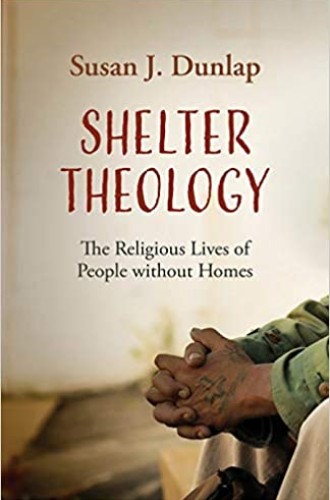Stories of the unhoused faithful
Listening to the poorest and most dislocated, Susan J. Dunlap hears the music of faith.
Changes in farm and factory economies have resulted in zones of urban suffering in Durham, North Carolina. Neoliberal government policies have favored business interests over the well-being of neighborhoods and individual accumulation of wealth over the welfare of all members of the community, reducing employment opportunities for urban workers and corroding healthy local support systems. These economic developments and social changes have left some residents of Durham—especially some Black residents—stuck in extreme poverty and without homes. These people are the subjects of Susan Dunlap’s study.
The religious material culture of people without homes is limited, so Dunlap focuses on the architecture of their inner lives. Normally people arrive at the Urban Ministries of Durham shelter with few possessions and few family or community connections, but some of them carry “archives of beliefs, habits, memories, and embodied knowledge from their religious backgrounds.” Dunlap, who volunteers as a chaplain at UMD, helps them unpack these “belongings” in informal meetings and gatherings, using stories and songs.
An ordained Presbyterian minister who teaches pastoral care at Duke Divinity School, Dunlap is experienced in helping create safe spaces for people to tell their stories. As an ethnographic researcher, she listens carefully to the “resistance narratives” of the people she meets at UMD and notes how they contradict the usual stories told about people without homes. Many of the life stories she hears include survival experiences, imagine new meaning in poverty, or interpret events within biblical frameworks and theological formulas. These stories make up the heart of the book.
In one extended transcript, Dunlap records Joyce’s words. A Black woman, Joyce leaned on a walker as she declared, “God allows me to see his hand move” and told how she relies on God every day. “Every morning I put on the whole armor of God. I put the whole armor on. I’m a trooper. And I know God’s got me. . . . I have to count on that. I know God’s got me.” She named her father’s death by suicide as one of the moments of importance in her life. Addicted to alcohol, he blamed himself for his wife’s troubles. He tried “seven or eight times to kill himself for my mom,” Joyce stated.
Joyce worked a variety of jobs. She met her husband on the street where she sold sex. “After about the third time,” she said,
I was like, “Your money’s no good.” . . . I actually fell in love with him in the streets. And he was there for me all through my addiction. He never gave me money for drugs. But he didn’t say anything if I did them. He made sure that I took care of my grandmother and my grandson.
Recalling her years as a nursing assistant for Alzheimer’s patients, Joyce said, “I loved it. I loved it. I just liked to take care of the old people. I loved to hear their stories. I took care of them like they belonged to me.”
One evening, a Pentecostal minister knocked on Joyce’s door and invited her to church to be baptized with her husband. After the baptism, Joyce prayed for God to give her knowledge and wisdom and understanding. “He filled me quickly,” she said.
Some of the facts of Joyce’s resistance story, retold by Dunlap, contradict assumptions often made by those in power about unhoused Black women who live with substance abuse disorder and sell sex. Dunlap points out that Joyce told her story in the religious framework of a testimony and shaped her life memories under God’s authority. As a result of her sex work, Joyce met her husband and earned money to support her children. Her baptism, too, played out according to God’s plan. Dunlap writes, “She tells the story of a woman with a God-ordained purpose, with a God-sustained life, and whose God intervenes to provide a way to lead her to shelter.”
The free-form prayer services that Dunlap and other chaplains convene three times a week at UMD help to coalesce relationships between the residents and provide settings for pastoral care. Dunlap’s observations, reflections, and analyses return again and again to these services. Through extemporaneous prayers, music, testimony, and conversation, the services support people without homes as they create sacred spaces and communities “of belonging and recognition.”
Extensive footnotes and an impressive bibliography will make this book valuable to researchers, teachers, and students. But the spirit moving through it is compassion. Dunlap listened carefully to “the poorest, most dislocated, most marginalized people of her city” and heard the humanity and the music of faith in their voices. Then, with the wisdom of a scholar and the heart of a friend, she recorded their stories.





